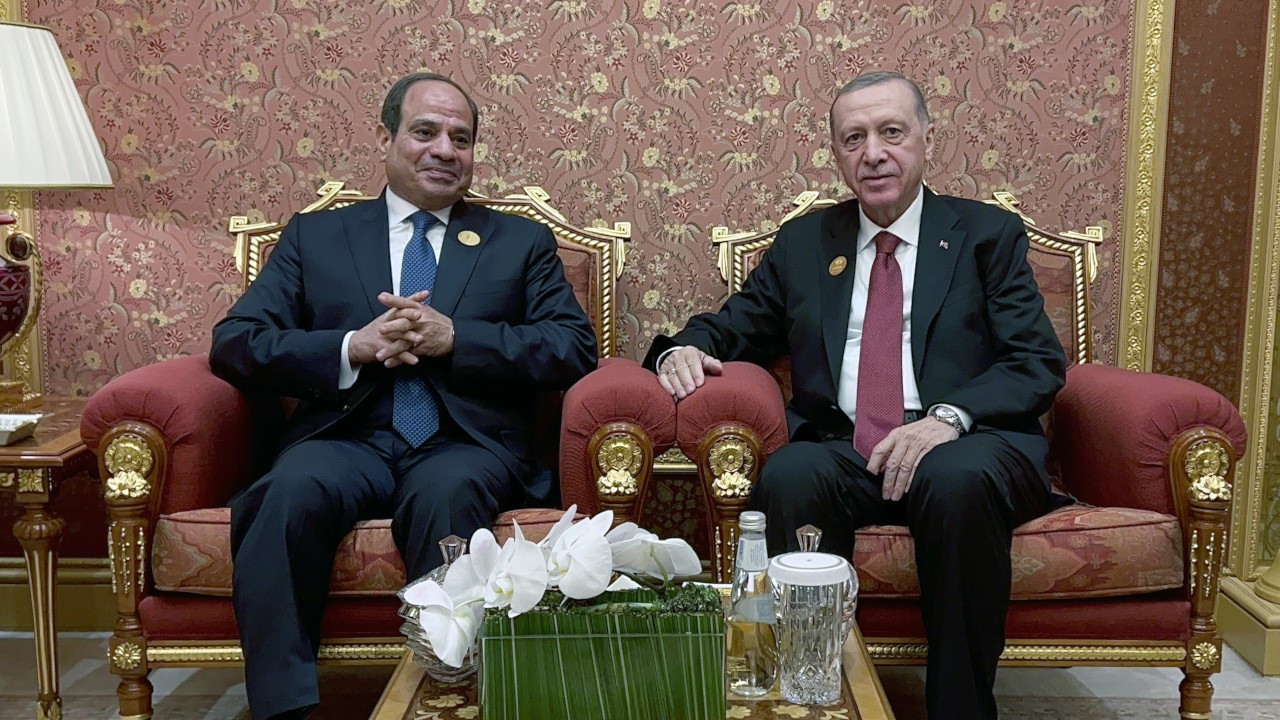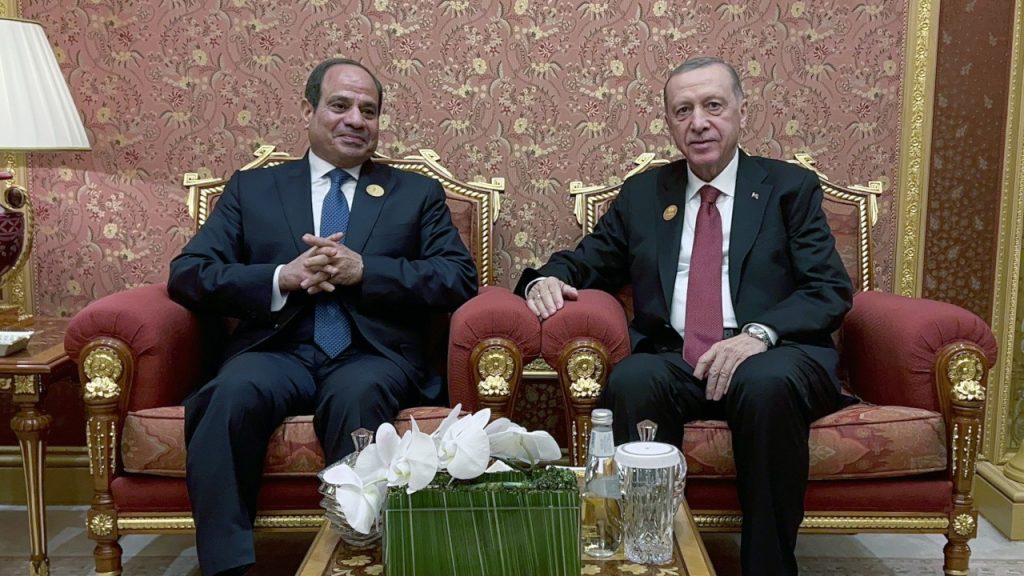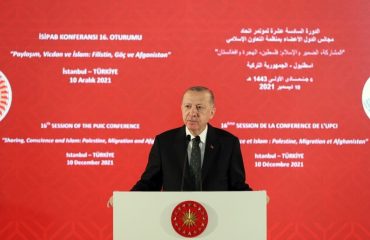

President Erdoğan cut ties with Egypt in 2011, after President Sisi, whom he called a “coup plotter” took over the power. Erdoğan’s expected visit on February 14th brings the questions with it about the cost of the lost years to Türkiye. Erdoğan met with Sisi in Riyadh in November 2023. (Photo: Presidency)
President Recep Tayyip Erdoğan is expected to visit the capital of Egypt, Cairo, on February 14, marking his first visit after 13 years of hiatus. The relationship between Türkiye and Egypt, located at the northern and southern ends of the Eastern Mediterranean, has always been significant for regional peace and stability.
A brief look at the historical background of the relationship reveals:
• There are strong historical, social, and cultural ties between the two countries, but throughout history, competition has been a significant dimension that can occasionally turn into political tension, leading to disruptions.
• During the era of Egypt’s legendary leader Gamal Abdel Nasser, relations were notably negative. Egypt, particularly during that period, stood strongly with the Greeks in the Cyprus issue, which was a crucial cause for Türkiye, citing non-aligned solidarity.
• The relationship between the two countries primarily developed during the 30 years of Hosni Mubarak’s rule from 1981 to 2011.
After the “Arab Spring” that began in 2011, Türkiye-Egypt relations took a different turn. The election of Mohammed Morsi, a candidate of the Muslim Brotherhood, to power in 2012, especially through free elections, brought great joy beyond satisfaction to the ruling circles in Türkiye.
Egypt and the Muslim Brotherhood
Egypt is the birthplace of the Muslim Brotherhood (Ikhwan al-Muslimin), and groups in Türkiye with a similar ideology have always been close to the Egyptian Brotherhood. Over the years, thousands of Turkish Republic citizens studying at Cairo’s Al-Azhar University have been another important aspect of the religious dimension of interaction.
During the Morsi period, relations progressed on the basis of “ideological closeness and brotherhood,” and the success of the Morsi administration became a priority for the Turkish government.
However, after the overthrow of Morsi by Abdul Fattah el-Sisi through a coup in 2013, Türkiye and Egypt found themselves in opposing camps, sparking an regional power struggles at an ideological level.
Due to Türkiye’s vehement reaction, unlike any other country in the world, to the coup against Morsi in Egypt, ambassadors were mutually withdrawn, political relations were reset, and economic and trade relations came to a standstill.
Sharp turns in foreign policy
President Erdoğan’s well-remembered words and reactions targeting Sisi and his administration have led to sharp turns in foreign policy. Türkiye and Egypt even came close to the brink of military conflict in Libya or through Libya.
During that period, due to the negative repercussions faced in the international community, the government, through the National Intelligence Organization (MİT), initiated a process of rapprochement with Egypt. Approximately two years later, in November 2022, Erdoğan and Sisi shook hands during Erdoğan’s visit to Doha at a World Cup match.
In the issues that caused the deterioration of relations between Türkiye and Egypt, such as Sisi coming to power through a coup, the killing of many opposition figures by security forces, and the trial and death of Morsi, there has been no change suggesting, “We started talks because the reasons that led us to break relations have disappeared” from that day to today.
There has been no change from that day to the present in the reasons that led to the deterioration of relations between Türkiye and Egypt, such as Sisi coming to power through a coup, the killing of many opposition figures by security forces, and the trial and death of Morsi. Hence there is no ground for saying “we started talks because the reasons that led to the deterioration of relations have disappeared.”
Lost years: What now?
This situation raises questions about the reasons for the lost years and the cost of the policy pursued during that period for our country. However, even in this case, the answers to these questions do not go beyond the “the best interests of the state dictated it then, it dictates it today,” or “realpolitik, pragmatic foreign policy.”
What happens next?
In leader-centric countries, as in almost every issue, relations with other countries are determined by the words that come out of the leader’s mouth. Considering that not many auspicious words came from the Turkish side until recently, it cannot be expected that the negative electricity created during the tense period will completely disappear overnight. Even though relations seem to have returned to normal, the parties will continue to monitor and test each other for some time.
Common and different points
With this in mind, both countries need to maximize the benefits of the new era. Egypt aims to consolidate its administration, develop its economy, and protect itself against internal/external risks. In Türkiye, the government is currently pursuing a pragmatic foreign policy, at least for now, putting aside its ideological inclinations regarding Egypt.
Investors who have managed to find their way even in adverse conditions in economic and trade relations will proceed more comfortably with the improvement in political relations. There is a room for cooperation in the energy field, but there may be some sensitivities related to alternative routes due to the geographical positions of the two countries and the dimension of third parties.
Utilizing the lost years and approaching Egypt, the Greek/Cypriot front is unlikely to want to pave the way to alternatives where Türkiye will stand out. Cooperation between the two countries on regional issues such as Libya and the Horn of Africa could contribute to problem-solving efforts.
Palestine, Hamas: Sensitive issues
Some political issues may be more problematic. Egypt has a special interest in the Palestinian issue and has not liked Türkiye’s excessive intervention in this matter that it sees within its jurisdiction. Türkiye’s relations with Hamas and its claim to be a mediator with Hamas and other countries, including Egypt, have increased this dissatisfaction.
Although Egypt, like many other Arab countries, does not favour Hamas, which is the Palestinian branch of the Muslim Brotherhood, it has always had relations with Hamas and is not in a position requiring mediation to meet with Hamas.
Another issue has been the Egyptians who fled to Türkiye after the 2013 coup. From various publications and statements, it is understood that the dissidents cut off the broadcasts from Türkiye and that some of them went to other countries. But what happened to some, especially those who were said to have been granted Turkish citizenship, is unknown. Egyptians will continue to follow this issue.
A step into the new era with Egypt
I do not know how many agreements will be signed in Cairo, whether there will be a special action, especially on the Palestinian issue, but President Erdoğan’s visit—especially on Valentine’s Day—will undoubtedly be an important step into a new era of cooperation between Türkiye and Egypt, which still harbours some sensitivities.


